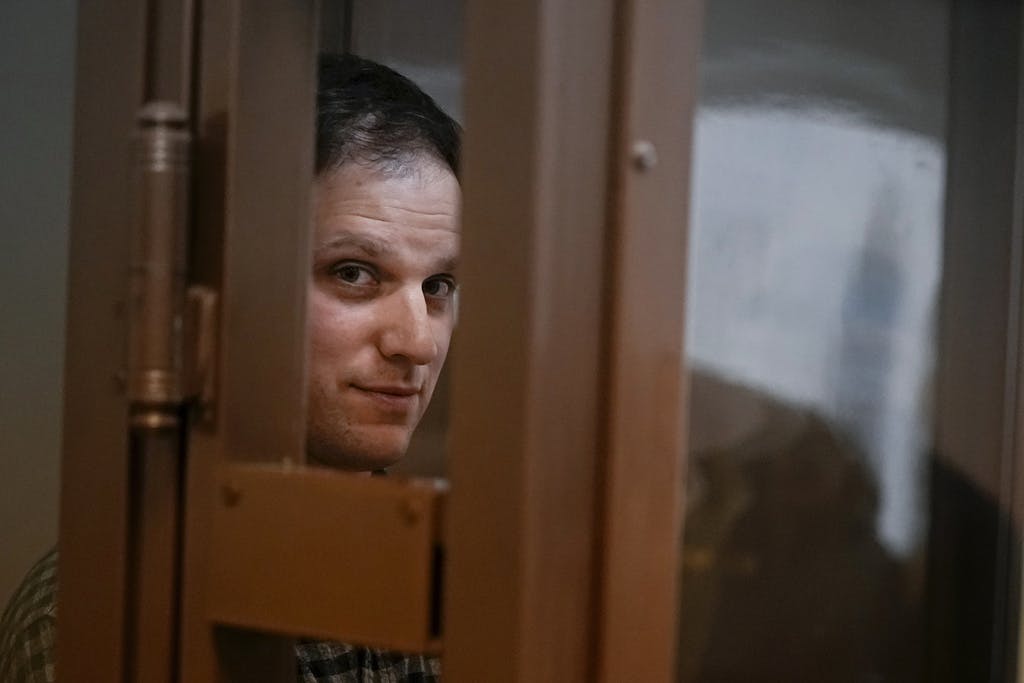Press Review: Obsession With Prigozhin Plane Crash Risks Obscuring Other Troubling Train Wrecks
An American journalist languishes in a Russian jail as President Putin refurbishes his yacht.

Only an ancient Greek sage or the digital equivalent of Nielsen ratings could say what generated more of a frenzy among press outlets this week: speculation as to the likely author of a spectacular plane crash in Russia or the mug shot of a former American president.
In the case of the latter it might not matter, especially considering how predictable it was that television networks like CNN would pounce on unflattering presidential photography. Yet the hype over the fate of President Putin’s one-time point man on all things mercenary, Yevgeny Prigozhin, risks obscuring Kremlin misdeeds of arguably greater consequence.
That is not to minimize the impact of the assumed assassination Wednesday five miles in the air north of Moscow. The vacuum in the Wagner group’s leadership will likely close up once the fighting units are simply subsumed by Russia’s defense ministry, which might have been Mr. Putin’s plan all along.
In the meantime, there are other developments in Russia that are no less shocking and that almost without exception implicate the Kremlin. One such reflects the abysmal state of press freedoms in Russia today. On Thursday Russia’s state news agency, Tass, reported that a 31-year-old Wall Street Journal reporter, Evan Gershkovich, is to remain jailed on espionage charges until at least the end of November.
Mr. Gershkovich’s original pretrial detention was set to expire on August 30. No trial date has been set yet. As the Journal reported, Thursday’s extension means that the American might spend at least eight months behind bars before a trial begins.
“Today,” a statement from the Journal reads, “our colleague and distinguished journalist Evan Gershkovich appeared for a pre-trial hearing where his improper detention was extended yet again. We are deeply disappointed he continues to be arbitrarily and wrongfully detained for doing his job as a journalist. The baseless accusations against him are categorically false, and we continue to push for his immediate release. Journalism is not a crime.”
Mr. Gershkovich’s lawyers said they will appeal the decision to extend his detention. The American ambassador to Moscow, Lynne Tracy, has visited Mr. Gershkovich three times since he was detained on March 28 by agents from Russia’s FSB, the successor agency to the KGB, where Vladimir Putin had a long career.
The most recent visit was earlier this month. Before that, in July, President Biden said that Washington is “serious about a prisoner exchange” to obtain Mr. Gershkovich’s freedom.
As events on the ground and in the air have demonstrated, Mr. Putin is not a man to brook opposition, going so far as to misconstrue routine journalistic inquiries as threats to his authority. That said, his chief political opponent, Alexei Navalny, is languishing in Russia’s IK-6 penal colony. Mr. Navalny, who incidentally on X referred to “the terrorist attack that Putin arranged to kill his soldier Prigozhin,” last week urged Russians to vote in upcoming regional elections next month.
It was this month that a Moscow court sentenced the 47-year-old Kremlin critic and campaigner to 19 years on a raft of new “extremism” charges. Mr. Navalny pulls no punches with his own resistance to President Putin’s ways and schemes.
One of those is exposing the ravenous Russ’s lavish lifestyle while he uses young Russians as cannon fodder in Ukraine. Mr. Navalny’s Anti-Corruption Foundation has lifted the lid on a $31 million renovation of Mr. Putin’s superyacht, the Kosatka.
The Kosatka, Russian for “killer whale,” cost a reported $125 million to build in the first place. With a warrant out for his arrest from the International Criminal Court, it is not clear what international waters Mr. Putin could safely ply.
The strongman is playing the long game, to be sure, but he is not the only Russian with staying power. This month the Biden administration threw Mr. Navalny something of a lifeline by imposing sanctions on four Russ operatives said to have been involved in his poisoning in 2020.
In the meantime Mr. Putin’s bloated boat, moored at St. Petersburg, now sports fun things like a refitted helipad, garish gold-trimmed bathrooms, and a dance floor that can be lowered to transform into a swimming pool.
There are lounge and bar spaces aplenty, but one beverage that won’t be served on board, should the vessel ever sail again, is Heineken beer. The Dutch brewer, which had suspended all new investments in Russia following the invasion of Ukraine, announced that it has now pulled out of the Russian market for good.
While it has been suggested that personal sanctions against Russian oligarchs are not having the desired effect, Russia’s consumer economy continues to be battered by Western capital flight and divestment.
According to the Russian Central Bank, a record $253 billion has been pulled out of Russia since the start of its full-scale invasion of Ukraine in 2022.
The Moscow Times reported that the rate of capital flight relative to GDP hit 13 percent in 2022, which broke the previous record of 11 percent during the 2008 global financial crisis as well as after Russia’s 2014 annexation of Ukraine’s Crimean peninsula.

